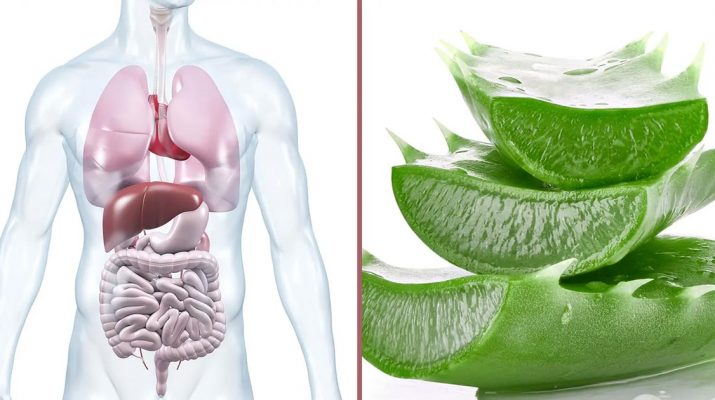Since ancient times, aloe vera has been used for a wide variety of medicinal purposes. The Native Americans referred to it as if it is made of magic, calling it the wand of heaven. Ancient Egyptians, on the other hand, called it the plant of immortality.
It’s really no surprise that it is so famous! Its reputation is well-deserved. This gel-filled plant is full of positive properties, and it contains more than 200 components that are biologically active and beneficial to the body.
Usually, aloe vera is used by applying it to the skin as a topical agent. You probably already know that it can treat burns, scrapes, insect bites, and more. But did you know that you can also consume aloe vera, whether as a juice, as a gel, or just directly eaten raw or cooked?
So, what happens when you consume aloe vera and its products? The answer is lots and lots of benefits. In fact, adding it to your daily diet can provide countless improvements to your health.
Scientists Explain What Happens To Your Body When You Take Aloe Vera Every Day
1. You Are More Hydrated
Hydration is crucial to basic health. Without enough hydration, some simple body functions become much more difficult to carry out. Without hydration, you can’t:
- Flush out waste and toxins
- Regulate body temperature
- Ensure good kidney and liver function
- Allow optimum nutrition absorption
- Enjoy smooth joint movement
- Keep blood pressure balanced
- Experience good circulation
Although most people aren’t severely dehydrated, many don’t get their recommended eight glasses of water a day, meaning they still aren’t receiving the water content their bodies require.
Aloe vera is a plant that is very packed with water, making it an ideal consumable for easy hydration. Drinking aloe vera juice can help you to rehydrate after exercise. Better yet, it’s very low in calories, with only 36 of them in one whole glass! If you buy commercial aloe vera juice, though, make sure that there aren’t too many additional grams of sugar.
2. Your Blood Sugar Levels Balance Out
Multiple studies have indicated that aloe vera can provide positive effects for the blood glucose levels of type 2 diabetes patients, as well as for those with prediabetes. It was found to help keep the blood sugar levels healthy and balanced during “fasting” phases of the day for these participants.
This is based on a paper entitled “Effect of Aloe vera on glycaemic control in prediabetes and type 2 diabetes: a systematic review and meta? analysis,” which was published in the Journal of Clinical Pharmacy.
It is worth noting that many different aloe vera products were tried in these studies included in the meta-analysis. Among all the types, aloe vera juice was found to be the most effective. With that being said, more studies are still needed in order to determine the scientific truth behind the links between aloe vera and blood glucose.
3. Inflammation Dies Down
Inflammation isn’t all bad. It is necessary for fighting off infections and helping the body to heal. But when inflammation becomes excessive and chronic, it has adverse effects on the body instead and can cause serious trouble. Some issues that may arise include:
- Seemingly random aches and pains
- Heartburn
- Difficulty sleeping
- Swollen lymph nodes
- Decreased positive thinking
- Congestion
- Joint problems
- Bone problems
- Digestive problems
- Headaches
- Respiratory problems
- Acne
- Oral health problems
- Constant exhaustion
- Difficulty concentrating or remembering
- Increased heart disease risk
- Higher depression risk
- Increased cancer risk
- Weight gain or difficulty losing weight
With that long list of potential problems, it’s safe to say that you’ll want to do everything you can to reduce negative inflammation. Aloe vera can do just that thanks to a number of compounds that naturally fight inflammation. These components are:
- C-glucosyl chromone
- Salicylic acid
- Bradykinase
These components provide anti-inflammatory properties to the body, which helps to keep unwarranted inflammation to a minimum. Countless studies show that aloe vera helps in treating diseases characterized by inflammation, such as digestive diseases, chronic pain diseases, and more.
4. You Have Fewer Digestive Problems
Digestive disorders are uncomfortable and difficult to manage. Even just simple digestive problems can be a real pain, and they can prevent you from receiving much-needed nutrients from food.
But aloe vera may be able to help with many of these issues. This is because they have a high enzyme content, and these enzymes work to break down fats, sugars, and other components that may slow and clog digestion.
Some digestive problems that can be helped by aloe vera are:
- Indigestion
- Gas
- Constipation
- Acidity
- Irritable bowel syndrome
- Ulcerative colitis
Let’s expand a little on this plant’s ability in certain areas:
· Irritable Bowel Syndrome
Studies have indicated that aloe vera juice has positive effects on IBS patients, reducing overall intestinal and stomach irritation. This led to pain reduction. However, further research is necessary.
· Ulcerative Colitis
A double-blind placebo study revealed that patients with ulcerative colitis experience reduced discomfort with regular aloe vera juice consumption.
· Constipation
Aloe vera has some properties that make it a good natural laxative. A small serving is a good idea if it’s your first time attempting this treatment for regular constipation. Do speak to your doctor before using it on a long-term basis.
5. Your Immunity Gets A Boost
Aloe vera is absolutely packed with vitamin C. You likely already know that this vitamin is extremely crucial in maintaining positive health. This is because the vitamin is anti-inflammatory and is also an antioxidant, and thus, it protects your immune system and strengthens it. Here are some of its benefits:
- Reduces high blood pressure
- Improves white blood cell function
- Helps illness recovery
- Increases iron absorption, reducing deficiencies
- Lowers heart disease risk
- Improve memory and cognitive ability
- Reduces chronic disease risk
- Reduces gout risk
- Increases positive thinking
Just one glass of aloe vera juice contains an impressive 9.1 grams of this nutrient. That’s a significant amount of the recommended dietary allowance of vitamin C, which currently sits at 90 mg for men and 75 mg for women. This means it has, at the very least, 10% of the RDA.
6. Your Body’s Ph Levels Balance Out
Acidic foods are not necessarily inherently bad, but many people do not work hard in maintaining an even and balanced pH – and acidic foods are much more common in the average meals. Examples of acidic foods include:
- Some dairy items
- Fresh meats
- Grains
- Fish
- High-protein foods
- Processed food
- Sweetened drinks
- Sugar
- Protein supplements
Acidity is an easy breeding ground for all sorts of infections, illnesses, and diseases. As such, it is necessary to consume alkaline foods in order to balance out this acidity. If not, you will experience problems such as:
- Digestive issues
- Fatigue
- Joint pain
- Migraines
- Muscle pain
- Halitosis
- Cramps
- Skin issues and allergies
- Fungal infections
- Demineralization
- Muscle atrophy
- Osteoporosis
- Kidney stones
- Other diseases
Aloe vera is a very alkaline food product. Thus, if you drink aloe vera juice regularly, you can help balance out the pH within your system and, therefore, avoid all sorts of nasty health issues later on. Remember, balance is key, so don’t overdo it!
7. Your Skin Clears Up
Nobody wants to have to deal with acne, spots, and blemishes. Topical applications of aloe vera gel have proven many times to have positive effects on skin “imperfections,” including wrinkles. But did you know that consuming aloe vera can provide those same benefits – and, sometimes, more effectively?
This is because of the hydrating effects of aloe vera, as well as its richness in all sorts of nutrients. Essentially, it starts to keep your skin healthy from the inside, allowing you to enjoy clearer skin.
But it’s not just acne that is reduced with regular aloe vera consumption. Aloe vera has an overall positive effect on all aspects of skin. As such, it has been found to:
- Reduce dermatitis
- Reduce psoriasis
- Neutralize UV radiation effects
- Prevent wrinkles
- Prevent fine lines
8. Your Oral Health Improves
We’ve talked about aloe vera’s antioxidant and anti-inflammatory effects, but this miracle plant also holds antibacterial and antimicrobial properties that make it fantastic for maintaining healthy teeth and gums.
Given the prevalence of gum disease, tooth decay, and oral hygiene issues, it’s a good idea to try and prevent them from happening to you. First, you have to understand why they occur in the first place.
Plaque buildup is the main cause of a variety of oral health issues. Essentially, plaque is a kind of bacterial biofilm. Aloe vera can fight this plaque, as it kills microorganisms responsible for causing the plaque and other mouth-related problems. These microorganisms are Streptococcus mutans, which is primarily responsible for creating plaque, and Candida albicans, which is a type of yeast.
But is it really effective? Studies say yes! Research has indicated that aloe vera juice is actually just as effective as a mouthwash when it comes to keeping the mouth clean and preventing bad bacteria from taking root. In fact, its positive effects are just the same as when chlorhexidine, the main ingredient in most mouthwashes, is used!
Final Thoughts On What Happens To Your Body When You Take Aloe Vera Every Day
Aloe vera has been known as an all-purpose, “miracle” plant for a long time, and it’s a title well-earned.
Do note that research indicates that excess aloe vera consumption can lead to adverse effects. As such, you should always maintain balance when consuming this plant or its products. If you notice any negative effects, stop taking it immediately and speak to a doctor. If you have existing health conditions, you may also want to speak to a doctor before taking aloe vera.
It is a good idea to educate yourself on possible side effects or negative effects of aloe vera, especially if you plan to eat aloe vera gel instead of drinking aloe vera juice. This way, you will be aware of what may occur if you consume it, and you can prepare for any potential issues later on.
With that being said, aloe vera does have plenty of proven health benefits, and negative effects are rare. As such, it’s no surprise that we look to it as a miracle plant. Eating a reasonable, balanced amount of aloe vera can definitely provide you with plenty of positives, so give it a whirl! You might be surprised by the results.


